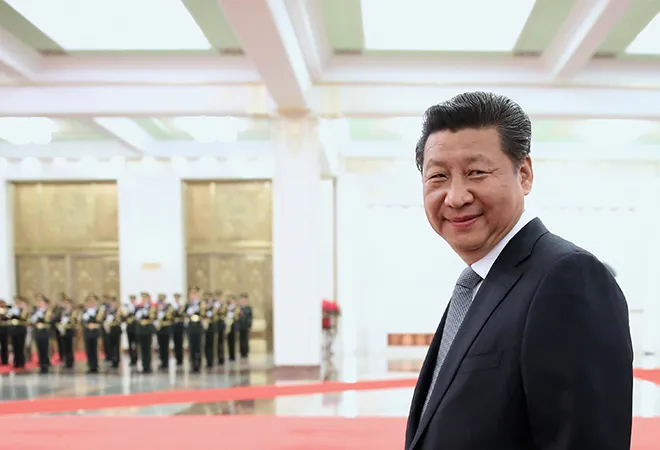-
CENTRES
Progammes & Centres
Location
Global pushback against China now targets the latter’s cultural and techno-nationalism

While the global pushback against China in the wake of the coronavirus pandemic was initially in the spheres of trade, technology access, human capital formation, and finance, it has now expanded into the realm of the nation’s ‘soft power’ and techno-nationalism — to which the China’s Communist Party (CCP) has great attachment.
Prof Joseph Nye, who conceptualised the construct of soft power, posited that a country could exert influence to serve its agenda using its culture, foreign policy, and political values. Rising nations of East Asia have been able to breach many boundaries due to their soft power. Japan’s Kurosawa, ‘manga’, Pokemon need no advertisement, K-pop is a walking-talking (singing?) advertisement for Korea. Even Taiwan’s dramas and ‘Mando-pop’ music genre have a huge appeal among ethnic Chinese overseas.
In his regard, China has been slow to grasp the potential of soft power. However, being bound to Deng Xiaoping’s maxim of ‘hide your capabilities, bide your time’ gave way to the concept of ‘peaceful rise’. Even this seemed alarming to some, and later in the Hu Jintao era ‘harmonious society’ and ‘peaceful development’ became popular catch phrases. Belatedly in 2004, to bolster its soft-power quotient, China began to promote ‘Confucius centres’ to “spread Chinese language and culture”. Recently, the Indian government announced a review of Confucius Institutes at universities across India. Under the lens are also agreements inked between Chinese institutions and Banaras Hindu University, Jawaharlal Nehru University, Indian Institutes of Technology and National Institutes of Technology. India’s newly unveiled National Education Policy sets aside ‘Mandarin’ as one of the foreign languages offered to secondary school students.
"China has been slow to grasp the potential of soft power. However, being bound to Deng Xiaoping’s maxim of ‘hide your capabilities, bide your time’ gave way to the concept of ‘peaceful rise’."
Chinese state-run media has published articles critical of India’s move, terming the “security concerns influenced by Western interests”. The Chinese embassy too has condemned the decision, urging the government not to “politicise cultural exchanges”. Over the last few years, academics have been carrying out a campaign to firewall China’s cultural outreach. Researchers in Australia and New Zealand extensively documented the use of Confucius centres as an extension of the Chinese state. There have been reports of students and teaching faculty "censoring" discussions on sensitive political issues such as the pro-democracy protests in Hong Kong, and Taiwan.
There have also been violent clashes at a number of Australian universities between students over the Hong Kong protests. Australian writer Clive Hamilton, who claims the CCP went to great lengths to scuttle his book on China’s “infiltration of Australian society”, terms the Confucius centres as “thought-management projects”, accusing them of “spying” and carrying out CCP’s agenda.
The Australian government launched an investigation into the role of Confucius Institutes in alleged cases of meddling by China inside the nation’s campuses and whether or not it had violated anti-foreign interference laws.
New Zealand researcher Anne Marie-Brady warns that efforts to shape opinion of foreign governments have vastly increased under President Xi Jinping’s reign. In her ‘Magic Weapons’ paper, Marie-Brady details how politicians of Chinese-origin were responsible for “political influence operations” at China’s behest. Marie-Brady’s paper led to a parliamentary inquiry into New Zealand elections and foreign interference.
While the blowback is currently limited only to Confucius centres, it could extend to other areas in the future. The ideological sinew for a cultural boycott against China emanates from the “success” of economic restrictions against the Soviet Union in the 1980s and sanctions against South Africa to protest against the apartheid. The People’s Republic’s insistence on a “One-China” policy subsumes Taiwan as a part of the mainland, effectively side-lining Taiwanese Mandarin (Guoyu). Human rights activists claim that since the Communist Revolution, the CCP has promoted Standard Mandarin as China’s national language and attempted to stamp out other tongues such as Standard Tibetan and Uighur languages. In fact under China’s law, even those advocating the promotion of education in their native tongues can be accused of fomenting separatism and may face jail term of as long as 15 years, if found guilty.
Activists have advocated a boycott of Standard Mandarin, and giving more prominence to Taiwanese Mandarin, pitting values of “dictatorial” China against “democratic Taiwan”. Currently, this demand is made by fringe Taiwanese sympathisers, but in the current scenario such a ban may find more takers. Already Taiwan seems to be back on the US agenda with American health secretary Alex Azar being the highest administration official visiting the island in nearly four decades.
US President Donald Trump’s pushback against Chinese techno-nationalism is not being limited to Huawei. Techno-nationalism is an ideological construct that connects a nation’s technological base and capacity for innovation to its self-image and economic wellbeing. China’s 1978 reforms were premised upon the modernisation of its economy in the fields of: science and technology, industry, agriculture, national defence. At the turn of the century, the aim of CCP leaders was to create a firewall against entry of tech firms like Google, Twitter and Facebook, and instead establish ‘national champions’ like Baidu, Alibaba and Tencent (known as the ‘BAT’ trinity).
"China’s 1978 reforms were premised upon the modernisation of its economy in the fields of: science and technology, industry, agriculture, national defence. At the turn of the century, the aim of CCP leaders was to create a firewall against entry of tech firms like Google, Twitter and Facebook, and instead establish ‘national champions’ like Baidu, Alibaba and Tencent."
Under the ‘Go Out’ policy, these national champions were expected to make their mark in foreign markets. While Trump’s 6 August directives queer the digital pitch for Tiktok and WeChat from doing business in America, he seems to be taking a leaf from China’s book in nudging a “US national champion” Microsoft to take over the video-sharing site. ByteDance (TikTok's owner) has time till 15 September to sell to an American company.
Trump is also baring his fangs at ‘BAT’ trinity of the China’s tech world. His ‘Clean Cloud’ initiative urges a boycott of the cloud-storage services of the BAT trinity that have a clear strategy to expand in the US market. The US government is rallying other nations to sign up on its “Clean Network” programme to choke Chinese tech companies, and claims over 30 countries backing its initiative.
Let’s make no mistake the glare on TikTok and Chinese Confucius centres strikes at China’s cultural and techno-nationalism. Currently, sunshine sectors and digital companies are the main focus of the CCP as it seeks to graduate from its status as a manufacturing hub to an innovator and incubator of sophisticated technology. China has little room to wriggle to hit back at US technology companies as it lags in the sphere of semi-conductors and robotics.
The views expressed above belong to the author(s). ORF research and analyses now available on Telegram! Click here to access our curated content — blogs, longforms and interviews.

Kalpit A Mankikar is a Fellow with Strategic Studies programme and is based out of ORFs Delhi centre. His research focusses on China specifically looking ...
Read More +